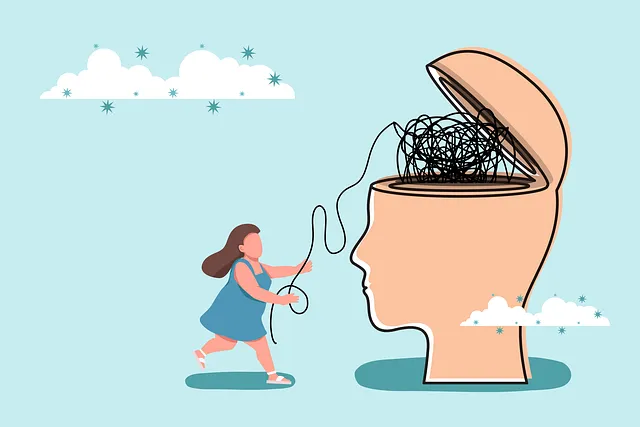Emotional intelligence (EI) is vital for personal and professional growth, especially in mental health settings like Lakewood's Kaiser services. Key components include self-awareness, empathy, and communication. Risk assessment helps maintain high EI among practitioners. Techniques like mindfulness and exercise enhance emotional well-being. Empathy strengthens connections, and effective communication deepens relationships. Cultivating self-awareness promotes resilience and authentic living. Understanding these aspects can improve mental health, making Lakewood's Kaiser services a valuable resource for residents.
Emotional intelligence (EI) is a powerful tool for personal and professional success. Understanding and managing your emotions, empathizing with others, and fostering effective communication are key components of building EI. By cultivating self-awareness, you can navigate relationships more skillfully and create deeper connections. This article explores these essential aspects, providing insights into how to enhance your emotional intelligence—a critical skill in today’s world, even for those seeking mental health services at facilities like Lakewood does Kaiser have.
- Understanding Emotional Intelligence: The Basics
- Identifying and Managing Your Emotions
- Empathizing with Others: Walking in Their Shoes
- Effective Communication for Deeper Connections
- Cultivating Self-Awareness for Personal Growth
Understanding Emotional Intelligence: The Basics

Emotional intelligence (EQ) is a crucial aspect of personal and professional growth, encompassing the ability to recognize, understand, and manage one’s own emotions as well as perceive, interpret, and respond appropriately to the emotions of others. It involves self-awareness, empathy, and effective communication, forming the foundation for strong relationships and successful interactions.
In today’s world, where mental health awareness is on the rise, understanding EQ becomes even more pertinent, especially in environments like Lakewood or Kaiser, which offer mental health services. The Risk Assessment for Mental Health Professionals and Risk Management Planning play a vital role in ensuring practitioners maintain high emotional intelligence to deliver quality care. By employing effective Communication Strategies, professionals can foster trust, understand clients’ perspectives, and provide tailored support, thereby revolutionizing the way they address mental health concerns.
Identifying and Managing Your Emotions

Identifying and managing your emotions is a crucial aspect of emotional intelligence building. This process begins with self-awareness—recognizing and understanding your feelings in any given moment. It’s akin to looking into a mirror, but for your inner world. Once you can identify what you’re feeling, whether it’s joy, anger, or fear, the next step is to manage those emotions effectively. Techniques like mindfulness meditation and deep breathing exercises have been proven to help individuals regulate their emotional responses, leading to better mental health outcomes.
When considering options for emotional intelligence development, remember that Lakewood does Kaiser have mental health services. These services can provide valuable support in navigating complex emotions and coping with life’s challenges. Additionally, promoting emotional well-being involves adopting healthy coping skills. This might include physical activities like exercise or creative outlets such as writing or painting. By integrating Emotional Well-being Promotion Techniques into your routine, you can enhance your ability to manage stress and maintain a positive mindset, all of which contribute to the development of strong emotional intelligence. Furthermore, regular risk assessments for mental health professionals are essential to ensure they have the tools needed to support clients effectively, fostering a safe and supportive environment for coping skills development.
Empathizing with Others: Walking in Their Shoes

Empathizing with others is a cornerstone of emotional intelligence, fostering deeper connections and understanding. It involves walking in someone else’s shoes, seeing situations from their perspective, and recognizing their feelings as valid. This skill is not merely about passing empathy; it’s about actively listening, observing body language, and cultivating an authentic desire to comprehend. By doing so, individuals can build stronger relationships, resolve conflicts more effectively, and create supportive environments, whether at home or in professional settings.
At Lakewood, for instance, Kaiser’s mental health services emphasize compassion cultivation practices as a means to enhance emotional intelligence. These practices encourage people to develop inner strength by cultivating empathy, which is crucial for navigating life’s challenges and reducing stress. Effective stress management, coupled with an empathetic mindset, can lead to improved communication, enhanced problem-solving abilities, and a more profound sense of compassion in our daily interactions.
Effective Communication for Deeper Connections

Effective communication is a cornerstone of building emotional intelligence and fostering deeper connections with others. By cultivating active listening skills, individuals can create an environment where feelings and thoughts are valued and respected. This, in turn, strengthens relationships, enhances empathy, and promotes understanding—all essential elements for mental well-being.
In today’s world, where issues like mental illness stigma reduction efforts are gaining momentum, mastering communication becomes even more critical. Lakewood, for instance, has recognized the importance of addressing these challenges and does offer Kaiser mental health services to support residents. Building resilience starts with open dialogue; it encourages individuals to share their experiences, fears, and hopes without fear of judgment. This process not only boosts confidence but also creates a supportive network that can help navigate life’s complexities.
Cultivating Self-Awareness for Personal Growth

Cultivating self-awareness is a cornerstone of emotional intelligence and personal growth. It involves recognizing your emotions, understanding their triggers, and gaining insights into how they influence your thoughts and behaviors. This process allows individuals to develop a deeper sense of themselves, fostering authenticity and self-acceptance. By paying attention to their internal experiences, people can begin to navigate life’s challenges with greater ease, making more thoughtful decisions and responding adaptively rather than reactively.
In the context of Lakewood and whether Kaiser offers mental health services, promoting emotional well-being through self-awareness practices is crucial. These skills enable individuals to manage stress, improve relationships, and enhance overall resilience. Compassion cultivation techniques, for instance, can help in developing empathy and kindness towards oneself and others, which is essential for building strong social connections. Emotional regulation strategies, another aspect of this process, empower people to handle intense emotions constructively, ensuring they don’t hinder personal growth or impact mental health negatively.
Building emotional intelligence (EI) is a transformative journey that enhances personal and professional relationships. By understanding and managing your emotions, empathizing with others, and cultivating self-awareness, you can foster deeper connections and navigate life’s challenges more effectively. Remember, Lakewood does Kaiser have mental health services as part of their comprehensive approach to well-being. Embracing these principles can lead to profound personal growth, making you more resilient, compassionate, and successful in all aspects of life.






